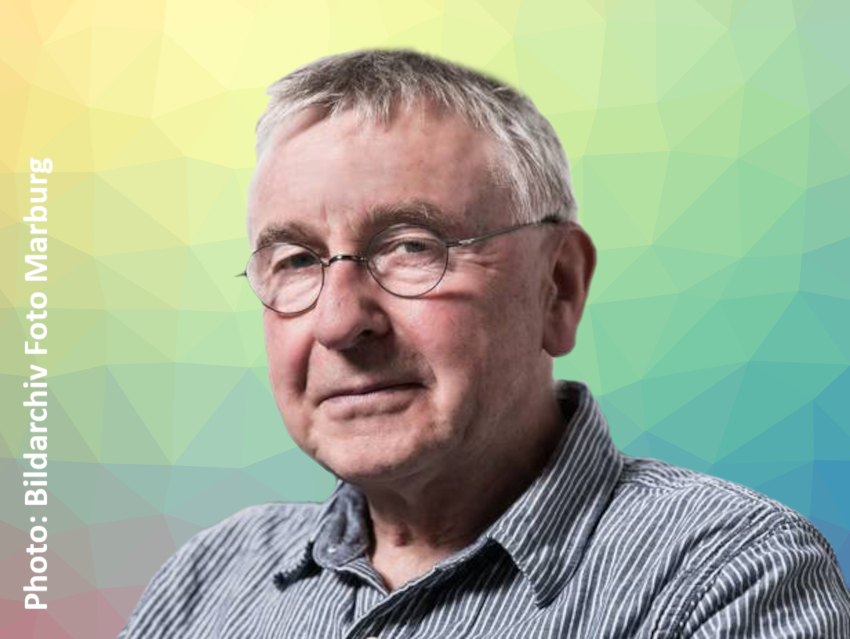Gernot Frenking, University of Marburg, Germany, has received the Erich Hückel Award 2020 from the Gesellschaft Deutscher Chemiker (GDCh, German Chemical Society). The award was presented at the online 57th Symposium on Theoretical Chemistry on September 22, 2021.
The Erich Hückel Award is endowed with EUR 7,500 and honors outstanding achievements in the field of theoretical chemistry. Frenking is recognized for his outstanding contributions to solving current problems in chemistry through the application of modern quantum-chemical methods. His research is focused on bond theory, in particular, on molecules with unusual chemical bonds.
Gernot Frenking studied chemistry at the Rheinisch-Westfälische Technische Hochschule (RWTH) Aachen, Germany, and received his Ph.D. from the Technical University Berlin, Germany, in 1979 for theoretical work on phosphorus compounds. He finished his habilitation, also at the Technical University Berlin, in 1984. After one year as Visiting Scientist at the University of California, Berkeley, USA, working with Henry F. Schaefer III, he joined the Stanford Research Institute, Menlo Park, CA, USA, as Staff Scientist in 1985.
In 1990, Gernot Frenking became Professor for Computational Chemistry at the University of Marburg, Germany, and in 1998, was named Full Professor for Theoretical Chemistry there. He remained in Marburg until his retirement in 2014. He continues his research there as Professor Emeritus and also serves as Ikerbasque Visiting Research Professor at the Donostia International Physics Center (DIPC), San Sebastian, Spain, and as Visiting Research Professor at Nanjing Tech University, China.
Among other honors, Professor Frenking has received the Elhuyar-Goldschmidt Prize from the Real Sociedad Española de Química (Spanish Royal Society of Chemistry, RSEQ) in 2007, the Schrödinger Medal from WATOC (World Association of Theoretical and Computational Chemists) in 2009, and the Hans Hellman Research Professorship Award of the University of Marburg in 2012. Among other commitments, he serves on the Editorial Board of the International Journal of Quantum Chemistry and as Editor of the Journal of Computational Chemistry.
Selected Publications
- Isolation of a Uranium(III)‐Carbon Multiple Bond Complex,
W. Su, Y. Ma, L. Xiang, J. Wang, S. Wang, L. Zhao, G. Frenking, Q. Ye,
Chem. Eur. J. 2021, 27, 10006–10011.
https://doi.org/10.1002/chem.202100699 - The strength of a chemical bond,
L. Zhao, M. Zhi, G. Frenking,
Int. J. Quantum Chem. 2021.
https://doi.org/10.1002/qua.26773 - A Critical Look at Linus Pauling’s Influence on the Understanding of Chemical Bonding,
S. Pan, G. Frenking,
Molecules 2021, 26, 4695.
https://doi.org/10.3390/molecules26154695 - Transition-Metal Chemistry of the Heavier Alkaline Earth Atoms Ca, Sr, and Ba,
Mingfei Zhou, Gernot Frenking,
Acc. Chem. Res. 2021, 54, 3071–3082.
https://doi.org/10.1021/acs.accounts.1c00277 - The Chemical Bond – an Entrance Door of Chemistry to the Neighboring Sciences and to Philosophy,
G. Frenking,
Isr. J. Chem. 2021.
https://doi.org/10.1002/ijch.202100070 - The Chemical Bond,
G. Frenking, S. Shaik,
Wiley-VCH, Weinheim, 2014.
ISBN: 978-3-527-33318-9 - Energy decomposition analysis,
M. von Hopffgarten, G. Frenking,
Wiley Interdiscip. Rev.: Comput. Mol. Sci. 2012, 2, 43–62.
DOI: 10.1002/wcms.71 - Carbodiphosphoranes: The Chemistry of Divalent Carbon(0),
R. Tonner, F. Öxler, B. Neumüller, W. Petz, G. Frenking,
Angew. Chem. I. Ed. 2006, 45, 8038–8042.
https://doi.org/10.1002/anie.200602552 - Investigation of Donor-Acceptor Interactions: A Charge Decomposition Analysis Using Fragment Molecular Orbitals,
S. Dapprich, G. Frenking,
J. Phys. Chem. 2002, 99, 9352–9362.
https://doi.org/10.1021/j100023a009 - The Nature of the Bonding in Transition-Metal Compounds,
G. Frenking, N. Fröhlich,
Chem. Rev. 2000, 100, 717–774.
https://doi.org/10.1021/cr980401l - A set of d-polarization functions for pseudo-potential basis sets of the main group elements Al–Bi and f-type polarization functions for Zn, Cd,
A. Höllwarth, M. Böhme, S. Dapprich, A. W. Ehlers, A. Gobbi, V. Jonas, K. F. Köhler, R. Stegmann, A. Veldkamp, G. Frenking,
Chem. Phys. Lett. 1993, 208, 237–240.
https://doi.org/10.1016/0009-2614(93)89068-S - A set of f-polarization functions for pseudo-potential basis sets of the transition metals Sc–Cu, Y–Ag and La–Au,
A. W. Ehlers, M. Böhme, S. Dapprich, A. Gobbi, A. Höllwarth, V. Jonas, K. F. Köhler, R. Stegmann, A. Veldkamp, G. Frenking,
Chem. Phys. Lett. 1993, 208, 111–114.
https://doi.org/10.1016/0009-2614(93)80086-5
Also of Interest
- Octacarbonyl Anion Complexes of the Late Lanthanides,
ChemistryViews 2019.
Assessing the 32-electron rule proposed almost 100 years ago - Calcium & Co. Acting Like Transition Metals,
ChemistryViews 2018.
Eight-coordinate alkaline earth-carbonyl complexes found - Why Does C2 Cause so Many Problems?,
Anne Deveson, Dieter Cremer, Gernot Frenking, Mario Piris, Sason Shaik,
ChemistryViews 2016.
https://doi.org/10.1002/chemv.201600022
The bonding situation in the carbon dimer is a controversial topic - Double Donation at Work in “Carbones”,
ChemistryViews 2013.
The carbon compounds “carbones”, recently discovered, have now been shown to stabilize cations other than BH2+ - New Type of Metal-Carbon Bond,
David Bradley,
ChemistryViews 2013.
A new type of metal-carbon bond that forms at the edges of aromatic compounds could open up a new field of structures - How Many Atoms Fit Into C60,
ChemistryViews 2011.
How many rare gas atoms can be placed into a fullerene cage until the pressure becomes large enough to break the framework? - Erich Hückel Prize for Hans-Joachim Werner,
ChemistryViews 2018.
Theoretical chemist honored for contributions to method development - Inaugural Erich Hückel Prize,
ChemistryViews 2016.
Werner Kutzelnigg honored for extraordinary contributions to theoretical chemistry




